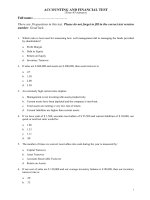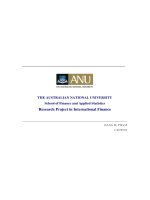NOUNS(COUNT AND UNCOUNT)
Bạn đang xem bản rút gọn của tài liệu. Xem và tải ngay bản đầy đủ của tài liệu tại đây (21.15 KB, 1 trang )
Page 1 of 1
www.englishpractice.com – Learn and practice English online.
Nouns with countable and uncountable forms
Many nouns have both countable and uncountable uses. There is usually a
difference of meaning.
Material nouns are usually uncountable. Examples are: gold, silver, iron, glass etc.
But sometimes a material noun can be used as a countable noun to refer to
something made of the material.
Compare:
I need to buy some typing paper. (Here paper is used as an uncountable noun.)
I am going to buy a paper. (= a newspaper)
Have you got any coffee? (Uncountable)
Two coffees, please. (Countable)
Many abstract nouns can have both countable and uncountable uses. The
countable form is used with a ?particular' meaning. The uncountable form is used
with a ?general' meaning.
Experience is the greatest teacher. (Uncountable) (NOT An experience is the
greatest teacher.)
I had a strange experience last week. (NOT I had strange experience last week.)
A/an with uncountable nouns
Note that most uncountable nouns cannot be used with a/an at all. But with certain
uncountable nouns referring to human emotions we have to use a/an when we are
limiting their meaning in some way.
I want my children to have a good education. (NOT I want my children to have
good education.)
She has a deep distrust of strangers. (NOT She has deep distrust of strangers.)
Some uncountable nouns are plural. They have no singular forms with the same
meaning, and cannot be used with numbers. Common examples are: arms,
remains, groceries, goods, customs, clothes, thanks, police etc.









